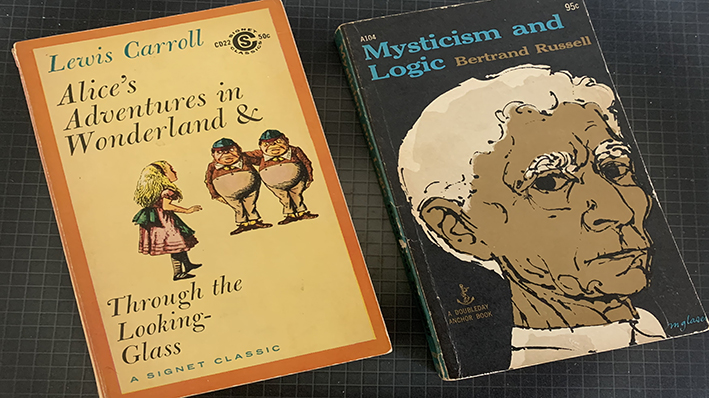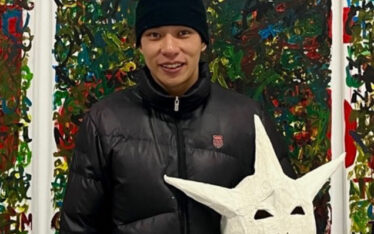
My contemporaries and I required a few in-depth choices so we could be sure of keeping various options open. We each had to select a major prior to our freshman year at college. Same as everyone else. Today, my daughter’s generation, the Gen Zers, go even further. They aggressively promote the virtues of their own point of view. Among the factors stressed by these up-and-coming Zoomers is the need to be reflective as they carefully think things out in a responsive manner without being the least bit impulsive.
Acclaimed philosopher Bertrand Russell declared in his essay Mysticism and Logic 1. “Metaphysics, or the attempt to conceive the world as a whole by means of thought, has been developed, from the first, by the union and conflict of two very different human impulses, the one urging men towards mysticism, the other urging them toward science.” 2. One risks, in making an intelligent choice, being torn between mystical and scientific, between the release of an inner creativity and a strictly analytical point of view. Artificial intelligence, in its own bizarre way, intersects the two and provides a positive light, helping to evaluate one’s selection.
My high-school guidance counselor encouraged me to seriously consider engineering. Rather than disagree, I instead narrowed my focus to aero/space. Wow, why not? Having been a top student in math and science, this piqued my interest. After all, aeronautical engineering embraced space exploration and, with it, endless growth prospects. A couple of close friends, both genuine math/science whizzes, already had zeroed in on this path. An inner voice hastily spoke out loud and clear, urging me to do the same. The problem was that I wanted to maintain a clear sense of flexibility should, later, I need to amend my initial choice. Although no way could I see myself remaining an engineer forever, at the same time my life experience had been too narrow and much too limited for me to even conjure what my future calling might be. No way I could envision the unforeseeable.
“Things that can be seen, heard, and learned,” he [Heraclitus] says, “are what I prize most.” 3.
Trying to generate fresh visions to inspire both our dreams and an ever-evolving basket of goals, my fellow freshmen and I relied on our imagination – individual and collective. Sure, some students who accepted that they had but a mere hint as to where they wanted to go and how best to get there, but nevertheless flaunted their egos and projected the illusion of possessing all the right answers. By comparison, I thought myself lucky to grasp at least a partial sense of the overall.
My senior year in high school I had enrolled in two advanced placement courses: a U.S. political science class and an introduction to calculus. Both were being taught by exceptionally bright, talented, knowledgeable instructors. Leading my calculus class was Dr. Budka, an amazing man with two separate Ph.D.s, one in math, the other in Slavic languages, both from Harvard. A semester earlier, I had immersed myself in a symbolic logic course he offered. It had completely captivated me so that, each day, I couldn’t wait for his class to begin. Dr. Budka possessed the unique ability to bring even the driest, most analytical material magically alive. For his logic course, we acted out the implied language of Lewis Carroll’s Alice in Wonderland and studied Bertrand Russell’s Mysticism and Logic for the impact of math and science on human culture.
The Poli Sci teacher, as scholarly as he was, unfortunately, would never be able to hold a light to Dr. Budka’s charisma. I had been foolish to compare the two. For calculus, I was extremely lucky also to have had my Uncle Al, a chemist who was a whiz at Math. A shame Al had missed his calling as a natural-born teacher. Nevertheless, he always had been there for me. We would chat five-nights-a-week, on the phone, to review Math and Physics, staying a good, week ahead of the rest of my class. I felt clearly inspired, and my fascination, of course, drifted in what then seemed an overwhelmingly positive direction.
The Poli Sci course, which focused on the impact of the Lincoln/Douglas debates and the horrors of a nation split in two over the issue of slavery, leading to the subsequent devastation of the American Civil War, should have been equally stimulating. And yet, as knowledgeable as the teacher was on these subjects, he was unable, in any way, to spark a scintillating debate or to bring the material spectacularly to life. His calm even-keeled approach produced lectures that came across quite flat and dry, unable to captivate our young burgeoning minds. The papers we wrote for his course, despite all our efforts, came across purely analytical. Which I wasn’t.
Similar expectations I had for a Creative Writing course that year quickly diminished when our teacher expected everyone to view artistic expression exactly as he imagined it. He possessed zero tolerance for anyone who didn’t, which amounted to virtually the entire class save the three who inexplicably clung to every syllable he uttered. But rather than encourage us, the teacher seemed to gain more satisfaction putting down his students’ efforts not in conformity with his own.
Thus, contrary to my natural inclinations, the prospect of taking the calculus AP totally captivated my interests, thanks my Uncle Al, my earlier experiences and Dr. Budka’s enthusiasm for Bertrand Russell’s writings.
During my first semester in Engineering school, however, virtually all of my classmates had taken Mechanical Drawing courses in high school, which should also have been a prerequisite for Descriptive Geo. Having previously been exposed to neither, and not being assigned any textbook or workbook for the course, I found myself at an immediate disadvantage. So, I naturally went to the professor for some tutoring by either him or a graduate assistant. But, to my surprise, he matter-of-factly suggested, if I intended to be an engineer, I’d better learn to work out the answers on my own. After such an abrupt meeting, whether or not it had been his intention, the professor managed to confirm in my mind that I never had been cut out to become an engineer.
To escape my frustration, my thoughts drifted back to Russell’s essay. “It is with this impartial temper that the mystic’s apparent insight into a higher reality and hidden good has to be combined if philosophy is to realize its greatest possibilities,” he noted. “And it is failure in this respect that has made so much of idealistic philosophy thin, lifeless and insubstantial.” 4.
“It is only in marriage with the world that our ideals can bear fruit,” declared the philosopher, “divorced from it, they remain barren. But marriage with the world is not to be achieved by an idea which shrinks from fact, or demands in advance that the world shall conform to its desires.” 5.
In order to attempt to bond in such a direction, I first had to be assured I was headed in the right direction. My less than satisfying experience with the Descriptive Geometry professor had dented my self-confidence and left me verbally cornered. I saw little choice but to take his callous advice and drop the course – which also just so happened to be an irrevocable requirement for an engineering degree.
The very next semester, without the least hesitation or regrets, I wasted no time and eagerly transferred out of Engineering to enroll in the college of Journalism. I realize, without a doubt, today I would do the very same. To that end, I believed a good general humanities program offered the first two years in school of Journalism would provide students a broad-based academic foundation that taught me how to reflect and think things through, how to evaluate the best choice of a curriculum and proved an excellent start in the right direction. Russell wrote in concurrence:
“From the point of view of training the mind, of giving that well-informed, impersonal outlook which constitutes culture in the good sense of this much-misused word, it seems to be generally held indisputable that a literary education is superior to one based on science.” 6.
I was sold and ready to take a chance. Most young people, then and now, have neither the knowledge nor experience to know who they are, and where they are, let alone where they want to go, or the path they plan to take to get there. Much to my dismay, I was no different.
Most of us needed a clearer understanding of the implications attached to each option. We also needed to still make this choice as enduring as possible. At such an early stage of the game, I faced a rather limited understanding of rapidly changing times. Most young people, then and now, have neither the knowledge nor experience to know who they are, and where they are, let alone where they want to go, or the path they plan to take to get there. Much to my dismay, I was no different.
Some time, we learn the hard way from our mistakes and hope not to make the same ones twice. What has been so difficult, however, was for my wife and I to let Caroline, our daughter, be totally free to follow her own instincts. Only by recalling how others unsuccessfully tried to influence me, have I learned to comfortably back off and watch from a distance and make the process work for the three of us. The way we each choose to live our lives will be essential to our emotional well-beings. Such a decision cannot be taken lightly. Few pay it sufficient attention. Even fewer take the time to weigh in and discover the potential consequences of making a so-called wrong turn. Impressionable individuals naïvely believe an answer will appear out of the blue. They imagine it landing in their laps as they wait to be clued in as to the next ultra-hot item, attitude or belief.
Today influencers are ready and waiting to cast a wide net to capture as many of these overtly receptive souls as possible. None of us should leave ourselves susceptible! Rather, be on our guard for so-called promoters. We should be aware of the crafty schemes in their playbook and all the self-serving tactics. So many of us can be tempted to take the easy route. We musn’t fall for an enticing package. “We are drowning in information while starving for wisdom.” 7. We must take our time, accept the challenge and perform our due diligence. We have to take the time to personally oversee our own research and investigate the possibilities that absolutely make the most sense.
In a second, I’d leap at a chance to completely start over yet once again. But it’s probably a bit late for me to climb comfortably onboard. Caroline, however, just graduated from U.C. Berkeley May ’23. This fall, to our surprise, Berkeley announced a future institution partnering private industry, government and academia. These component forces have joined together, ready to make the Berkeley Space Center, an amazing center for tomorrow. It seems the time has come again for many to not only look to aero-space engineering but also to understand there’s room for both space and humanities to coexist and prosper together.
In homage to Bertrand Russell, I remain open to the intervention of reason and welcome its mediation. “…there is no opposition to instinct as a whole but only to blind reliance upon some one interesting aspect of instinct to the exclusion of other more commonplace but not less trustworthy aspects. It is such one-sidedness, not the instinct itself that reason aims at correcting.” 8.
Reason provides motivation and motivation subsequently provides us with the drive. From there, it is up to us individually to be able to fit through the keyhole same as Alice did and behold all that she beheld and go on to deliver our vision.
___________________
1. Russell, Bertrand; Mysticism and Logic, Hibbert Journal, U.K. 1914.
2. Russell, Bertrand; Mysticism And Logic And Other Essays, Anodos Books; p.3.
3. Russell, Bertrand: The Place of Science in a Liberal Education, The New Statesman: May 24 and 31, 1913, p.1.
4. Russell, Bertrand; Mysticism And Logic And Other Essays, Anodos Books; p.6.
5. Ibid.
6. Russell, B.; The Place of Science in a Liberal Education; Mysticism And Logic And Other Essays, Anodos Books; p.19.
7. Zakaria, Fareed; In Defense of a Liberal Education, quoting E.O. Wilson.
8. Russell, B.; Mysticism And Logic And Other Essays, Anodos Books; p.3.
About the Article
Reflecting on the combatibility of creativity and analysis.



